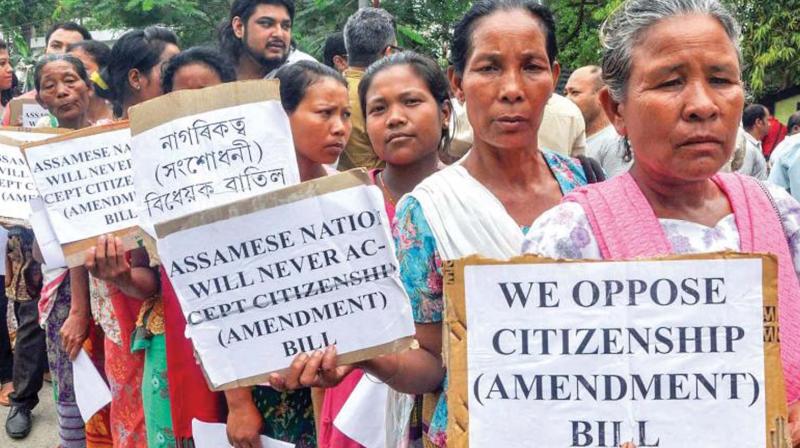The legal assault

On 8th of January, 2019, almost two and a half years after it was originally introduced, the Lok Sabha passed the Citizenship (Amendment) Bill, 2016. This was the first of three steps that need to be completed for this proposed legislation to become the law of the land. In order for the amendments proposed in the Bill to become operative, the government must secure the necessary support in the Upper House of Parliament for the Bill, and the Bill must receive Presidential Ascent.
There are several potential issues that plague this Bill and the amendments proposed in it, chief among which is the proposed amendment to the definition of “illegal migrant” under the Citizenship Act, 1955. This Act originally defined illegal migrants to include any and all foreigners who had either entered India without a valid passport or other travel related documents, as well as those foreigners who had stayed on in India beyond the period of time for which they had been authorised by the government. This Bill proposes to create an exception to this rule for persons belonging to minority communities of the Hindu, Sikh, Buddhist, Jain, Parsi and Christian faiths, from three specific countries, namely Afghanistan, Bangladesh and Pakistan. By the proposed amendment, such individuals would be eligible to apply for citizenship by naturalisation, which is a process that they could not have availed if they were categorised as illegal migrants. Additionally, the Bill also proposes an amendment which reduces the
time frame within which these individuals could obtain citizenship by naturalisation.
This amendment essentially confers on a specific group of individuals certain rights, solely based on their places of birth or religious inclinations. If these migrants had been citizens of India, the state would have been barred from enacting such a law under Article 15 of the Constitution, which expressly prohibits the state from engaging in any form of discrimination of citizens on the basis of religion or place of birth.
But under Article 15 of the Indian Constitution, the state is not required to extend this right against discrimination to non-citizens. These very rights, that have been held to be inalienable to our citizens, are denied to other migrants merely because they were not born in the right country or were not raised in the right faith.
But under Article 14 of the Constitution, the state is required to extend to every person, citizen or not, the right to equality before the law or the equal protection of the laws within the territory of India. I believe that it is this provision of the Constitution that the proposed amendment is likely to attract.
The provisions of the Bill create a separate class of individuals, which would be acceptable if such a classification had a justifiable basis. The Statement of Object and Reasons accompanying the proposed Bill provides little to no insight regarding why only these specific minority communities from these specific countries must be granted a special status under the Citizenship Act, 1955.
This amendment seems to be aimed at increasing the efficiency with which individuals may become eligible to acquire citizenship, which in itself is a noble and worthy cause. But, limiting this right to a select few strikes at the very core of our constitutional values.
Absent an explanation for this classification, the amendment proposed to the Act may be liable to be classified as arbitrary, and consequently struck down as being in contravention to Article 14 of the Constitution.
The second aspect of the Bill focuses on Overseas Citizens of India (OCIs) and rights accruing to them under Section 7D of the Citizenship Act, 1955. The proposed amendment seeks to impose stricter sanctions on OCIs, in the form of OCI Card cancellation for violating any laws of India that are applicable to them.
This appears to be a kneejerk reaction to the recent frenzy surrounding the high-profile cases of Nirav Modi and Vijay Mallya, among others, where the government has not been successful in bringing individuals responsible for financial crimes to justice.
But this amendment does not restrict itself to any one category of crime, but brings within its ambit any and all violations of Indian law, thereby putting a murderer, a petty thief, and a fraudster on the same footing. The specific provision of the Citizenship Act, 1955 does vest the government with a degree of discretion in this regard, as is clear from the use of the word “may” in Section 7D (“The Central Government may, by order, cancel the registration granted”). It remains to be seen how the government exercise its new-found authority, should this Bill become law.
Overall, if bonafides are to be presumed, the Bill in question is well-intentioned and has its heart in the right place. But in this specific case, I do not believe that the ends are justified by the means.
If the government truly wishes to cater to the downtrodden minority communities of foreign states, enacting citizenship laws that are contingent on their faith and beliefs does not seem to be an ideal approach to achieve that objective. The Bill’s correlation between religion and citizenship undermines the secular foundations of our constitutional democracy.
We can only hope that the concerns raised by several sections of the population regarding the long-reaching implications of this Bill are duly addressed by the Government in a timely and expedient manner.
The writer is senior research associate, Jindal Global Law School, Sonipat.
Email: ashwin.nlu@gmail.com

